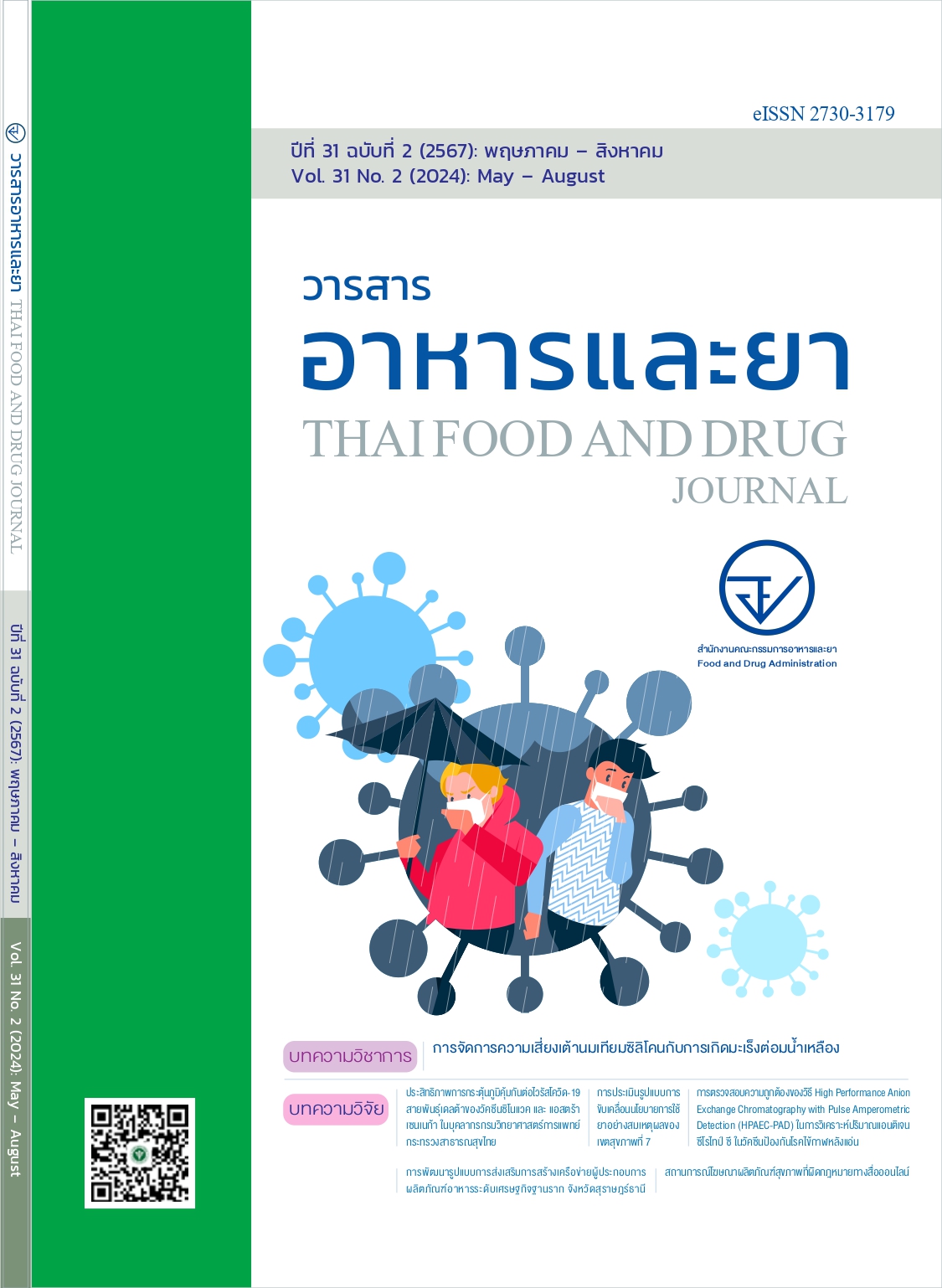การพัฒนารูปแบบการส่งเสริมการสร้างเครือข่ายผู้ประกอบการผลิตภัณฑ์อาหารระดับเศรษฐกิจฐานราก จังหวัดสุราษฎร์ธานี
Main Article Content
บทคัดย่อ
ความสำคัญ : การสร้างเครือข่ายทางธุรกิจเป็นทางเทคนิคในการปรับตัวเพื่อความอยู่รอดขององค์กรขนาดเล็ก โดยการรวมตัวกันขององค์กรขนาดเล็กหลาย ๆ องค์กรเพื่อดำเนินธุรกิจให้ได้ประโยชน์เทียบเท่าธุรกิจขนาดใหญ่ จังหวัดสุราษฎร์ธานีเป็นจังหวัดหนึ่งที่เห็นความสำคัญของการผลิตและการพัฒนาคุณภาพผลิตภัณฑ์สุขภาพเพื่อส่งเสริมสถานประกอบการให้ได้คุณภาพมาตรฐาน
วัตถุประสงค์ : เพื่อวิเคราะห์สถานการณ์ต่อการดำเนินธุรกิจของผู้ประกอบการผลิตภัณฑ์สุขภาพระดับเศรษฐกิจฐานรากจังหวัดสุราษฎร์ธานี สร้างรูปแบบการพัฒนาเครือข่ายเชิงบูรณาการในการพัฒนาผู้ประกอบการผลิตภัณฑ์สุขภาพระดับเศรษฐกิจฐานรากจังหวัดสุราษฎร์ธานี และประเมินความพึงพอใจและรูปแบบการพัฒนาเครือข่ายเชิงบูรณาการในการพัฒนาผู้ประกอบการผลิตภัณฑ์สุขภาพระดับเศรษฐกิจฐานรากจังหวัดสุราษฎร์ธานี
วิธีวิจัย : เป็นการวิจัยและพัฒนาเชิงทดลองแบบกลุ่มเดียว สิ่งที่ใช้ในการทดลองคือ รูปแบบการดำเนินงาน ที่พัฒนาขึ้น นำไปทดลองที่จังหวัดสุราษฎร์ธานี ระหว่างปี พ.ศ. 2562 ถึง 2566 โดยมีการปรับปรุงเป็นระยะอย่างต่อเนื่อง กลุ่มตัวอย่าง คือ ผู้ประกอบการผลิตภัณฑ์อาหารระดับเศรษฐกิจฐานรากจังหวัดสุราษฎร์ 6 ราย ที่ชนะได้รางวัล อย.ควอลิตี้ อวอร์ดระดับประเทศในปี พ.ศ. 2562 - 2566 จากนั้นดำเนินการ 3 ขั้นตอน ได้แก่ (1) สำรวจสภาพปัญหาเบื้องต้นของผู้ประกอบการผลิตภัณฑ์สุขภาพระดับเศรษฐกิจฐานราก (2) พัฒนาต้นแบบ ทดลองในกลุ่มตัวอย่างโดยให้การสนับสนุนจากเครือข่ายจังหวัดสุราษฎร์ธานีซึ่งมีการปรับปรุงต้นแบบอย่างต่อเนื่อง (3) ประเมินประสิทธิผลของต้นแบบและผลประเมินความพึงพอใจของกลุ่มตัวอย่าง
ผลการศึกษา : ผลการศึกษาปัญหาในการดำเนินธุรกิจของกลุ่มตัวอย่างผู้ประกอบการ พบว่าปัญหาสำคัญคือ (1) ต้นทุนแรงงานสูงเมื่อเทียบกับต่างประเทศ (2) วัตถุดิบไม่เพียงพอที่จะนำไปแปรรูปเนื่องจากได้รับผลกระทบจากภัยธรรมชาติ (3) แหล่งเงินทุน (4) คู่แข่งทางการค้า (5) การคงคุณภาพและการยืดอายุสินค้า (6) เครือข่ายยังอยู่ในวงแคบ ซึ่งสิ่งที่กลุ่มตัวอย่างต้องการคือการสนับสนุนจากภาครัฐบาลและเอกชน เช่น ความรู้ การพัฒนาฝีมือแรงงาน เทคโนโลยีที่เข้ามาช่วยสนับสนุน รวมถึงเงินทุนต่าง ๆ และรางวัล อย.ควอลิตี้ อวอร์ด ที่ช่วยยกระดับฐานะของสินค้าให้มีศักยภาพเพิ่มขึ้นเนื่องจากรางวัลเป็นการรับประกันคุณภาพ สร้างชื่อเสียง และผลกำไร เมื่อนำรูปแบบการพัฒนาเครือข่ายบูรณาการในการพัฒนาผู้ประกอบการผลิตภัณฑ์อาหารระดับเศรษฐกิจฐานรากจังหวัดสุราษฎร์ธานีมาใช้ส่งเสริมตั้งแต่ต้นน้ำ กลางน้ำ และปลายน้ำ โดยมีเครือข่ายภาครัฐ เอกชน มหาวิทยาลัย และวิสาหกิจชุมชนร่วมมือกัน พบว่าผลลัพธ์ที่เกิดขึ้นสามารถขับเคลื่อนปัจจัยสภาพแวดล้อมภายนอก ภายใน และกระบวนการดำเนินงานได้ เช่น การเข้าถึงแหล่งทุน การพัฒนามาตรฐานสินค้า การพัฒนาอัตลักษณ์ชุมชน การจัดกิจกรรมกระตุ้นเศรษฐกิจ การส่งเสริมทุนวัฒนธรรม การใช้องค์ความรู้และภูมิปัญญาชุมชน เป็นต้น และเมื่อประเมินผลจากความพึงพอใจ พบว่าผู้ประกอบการมีความพึงพอใจในระดับมากที่สุด เฉลี่ยระหว่าง 4.50 – 5.00 จากคะแนนเต็ม 5
สรุป : การนำรูปแบบการพัฒนาเครือข่ายบูรณาการในการพัฒนาผู้ประกอบการผลิตภัณฑ์อาหารระดับเศรษฐกิจฐานรากจังหวัดสุราษฎร์ธานีมาใช้โดยบูรณาการ 4 ภาคส่วน ได้แก่ ภาครัฐ เอกชน มหาวิทยาลัย และวิสาหกิจชุมชน ช่วยส่งเสริมปัจจัยสภาพแวดล้อมภายนอก ปัจจัยภายใน และกระบวนการดำเนินงานครบวงจร ทำให้ผู้ประกอบการพึงพอใจระดับมากที่สุด ซึ่งควรนำไปประยุกต์ใช้เพื่อส่งเสริมในพื้นที่อื่นต่อไป
Article Details

อนุญาตภายใต้เงื่อนไข Creative Commons Attribution 4.0 International License.
เอกสารอ้างอิง
ประสงค์ ตันพิชัย, สันติ ศรีสวนแตง, นิรันดร์ ยิ่งยวด, สุภาสิณี นุ่มเนียม, พัชราภา กล้าหาญ, อภิญญา อุดมเวช, และคณะ. รายงานวิจัยฉบับสมบูรณ์ โครงการการพัฒนาเศรษฐกิจฐานรากภายใต้ความร่วมมือของภาคีภาครัฐ ภาคเอกชน และภาคประชาสังคมในการขับเคลื่อนการพัฒนาโซ่แห่งคุณค่าของอาหารปลอดภัยในจังหวัดกาญจนบุรี [อินเทอร์เน็ต]. กรุงเทพฯ: สำนักงานคณะกรรมการส่งเสริมวิทยาศาสตร์ วิจัยและนวัตกรรม; 2564 [เข้าถึงเมื่อ 10 พ.ย. 2566]. เข้าถึงได้จาก: https://kukr.lib.ku.ac.th/kukr_es/kukr/search_detail/result/20013853
กระทรวงการอุดมศึกษา วิทยาศาสตร์ วิจัยและนวัตกรรม. นโยบายและยุทธศาสตร์ การอุดมศึกษา วิทยาศาสตร์ วิจัยและนวัตกรรม พ.ศ. 2563 - 2570 และแผนด้านวิทยาศาสตร์ วิจัยและนวัตกรรม พ.ศ. 2563 – 2565 [อินเทอร์เน็ต]. กรุงเทพฯ: กระทรวงการอุดมศึกษา วิทยาศาสตร์ วิจัยและนวัตกรรม; 2562 [เข้าถึงเมื่อ 10 พ.ย. 2566]. เข้าถึงได้จาก: https://backend.tsri.or.th/files/trf/2/docs/Policy_and_Strategy_of_Thailand_HESI_2563-2570_and_Thailand_SRI_Plan_2563-2565.pdf
กระทรวงอุตสาหกรรม. เศรษฐกิจหมุนเวียน (CIRCULAR ECONOMY) [อินเทอร์เน็ต]. กรุงเทพฯ: กระทรวงอุตสาหกรรม; 2549 [เข้าถึงเมื่อ 10 พ.ย. 2566]. เข้าถึงได้จาก: https://thaiindustrialoffice.wordpress.com/2016/07/03/เศรษฐกิจหมุนเวียน-circular-economy/
บุญฑวรรณ วิงวอน. การเป็นผู้ประกอบการเชิงกลยุทธ์. กรุงเทพฯ: มหาวิทยาลัยรามคําแหง; 2555.
ประคอง กรรณสูต.สถิติเพื่อการวิจัยทางพฤติกรรมศาสตร์.กรุงเทพฯ: จุฬาลงกรณ์มหาวิทยาลัย; 2542.
สำนักงานพัฒนาวิทยาศาสตร์และเทคโนโลยีแห่งชาติ. แผนปฏิบัติการด้านการขับเคลื่อนการพัฒนาประเทศไทยด้วยโมเดลเศรษฐกิจ BCG พ.ศ. 2564-2570 [อินเทอร์เน็ต]. กรุงเทพฯ: สวทช.; 2562 [เข้าถึงเมื่อ 20 ต.ค. 2566]. เข้าถึงได้จาก: https://www.bcg.in.th/bcg-action-plan/
กอบกุลณ์ คำปลอด, ทศพล พงษ์ต๊ะ. การวิเคราะห์ศักยภาพชุมชนเพื่อสร้างนวัตกรรมการพัฒนาเศรษฐกิจฐานราก ของชุมชนในอำเภอป่าแดด จังหวัดเชียงราย. วารสารสังคมศาสตร์วิชาการ [อินเทอร์เน็ต]. 2565 [เข้าถึงเมื่อ 20 ต.ค. 2566]; 15(1):1-16. เข้าถึงได้จาก: https://so04.tci-thaijo.org/index.php/social_crru/article/view/248009/175796


